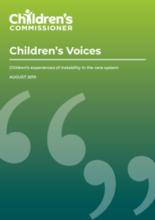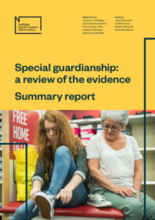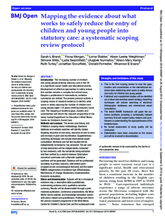Displaying 741 - 750 of 2221
‘Children’s Voices: Children’s experiences of instability in the care system’ is published alongside the Children’s Commissioner’s third annual Stability Index and features interviews with 22 children in England who are in care or care leavers.
The primary aim of this study was to explore individual characteristics that could predict the quality of life and level of distress of foster care alumni.
This rapid evidence review is intended to contribute to the drafting of authoritative guidance to assist courts in the UK in making Special Guardianship Orders (SGOs) and to help inform decision-making by frontline practitioners.
This open access paper [from the Child & Family Social Work special issue on teenagers in foster care] reports on findings from the first study of LGBTQ young people in care in England and focuses on the nature of foster carers' experiences and perspectives on caring for LGBTQ young people.
This paper explores practice examples relating to young people's transitions from care to adulthood.
This editorial summarises a range of research in this special issue covering parenting styles, transitions out of care, child sexual exploitation, and the needs of LGBTQ and separated teenagers.
This secondary analysis of data describing 3,035 parents, drawn from the National Survey of Child and Adolescent Well-Being II, identified factors fostering the collaborative alliance of parents and caseworkers within the child welfare system.
The present protocol outlines a scoping review of research evidence to identify what works in safely reducing the number of children and young people (aged ≤18 years) entering statutory social care.
Using evidence from the evaluation of specialist foster care provision and a child sexual exploitation (CSE) training course for foster carers, this paper [from the Child & Family Social Work special issue on teenagers in foster care] considers how training might be used to widen the pool of potential foster carers for children affected by CSE and identifies qualities displayed by effective carers.
The aim of this article [from the Child & Family Social Work special issue on teenagers in foster care] is to account for and discuss support to young care leavers within the comparable welfare regimes of Norway and Sweden and to explore key differences between these 2 countries.



